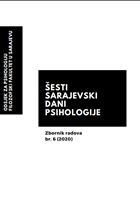Razlike u percepciji roditeljskog ponašanja između mlađih i srednjih adolescenata
Differences in Perception of Parental Behavior Between Young and Middle Adolescents
Author(s): Bojana Marinković, Jovana Šupić, Sretenka PetrovićSubject(s): Individual Psychology, Social psychology and group interaction, Behaviorism, Social Theory
Published by: Filozofski fakultet Univerziteta u Sarajevu
Keywords: early adolescence; middle adolescence; dimensions of parental behavior;
Summary/Abstract: Parental behavior is a significant factor influencing development, but this influence changes depending on the age of the child. Therefore, the aim of this study was to examine whether there are statistically significant differences in the perception of parental behavior, operationalized through the dimensions of emotionality and control (behavioral and psychological) in relation to early and middle adolescence. The sample includes 321 respondents from the population of primary and secondary school students. Of the total number of respondents, 164 are primary school students, aged 11 to 14 (M = 12.92; SD = 1.11). The remaining part of the sample consists of 157 high school students, aged 15 to 18 (M = 16.22; SD = 1.20). 183 respondents are female and 138 are male.For the purposes of this research, the CRPBI-57 questionnaire of children’s assessments of parental behavior on three dimensions was used, as well as the sociodemographic data questionnaire constructed for the purposes of this research. The results obtained using the Mann-Whitney U test indicate that there are significant differences between young and middle adolescents in the perception of maternal emotionality (U = 8811; p = 0.000; r = .26) and father emotionality (U = 9470; p = .001; r = .19). Also, there are significant differences in the perception of maternal (U = 9396; p = 0.000; r = .22) and paternal (U = 8855; p = .000; r = .26) behavioral control. In the perception of mother’s and father’s psychological control, there is no significant difference between younger and middle adolescents. The obtained results indicate that younger adolescents perceive a higher degree of emotionality and behavioral control by their mothers and fathers than middle adolescents. This is in line with the theoretical postulate of increased child dependence on parental attention, care and control at an earlier age, while middle adolescence represents a transition to independence, and a gradual process of individuation and separation from parental figures.
Journal: SARAJEVSKI DANI PSIHOLOGIJE: ZBORNIK RADOVA
- Issue Year: 6/2020
- Issue No: 6
- Page Range: 151-163
- Page Count: 13
- Language: Bosnian

